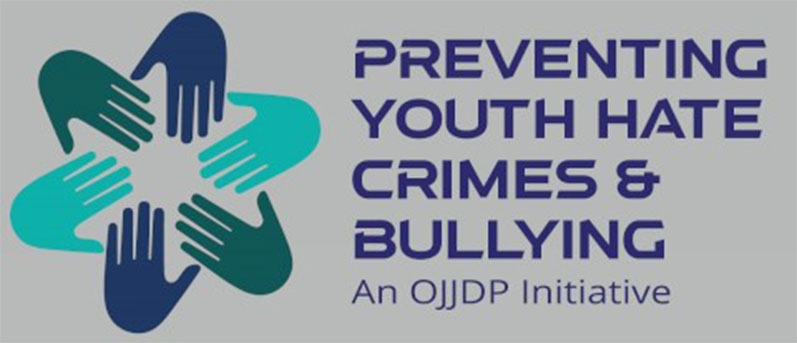Preventing Youth Hate Crimes and Identity-Based Bullying
Content Warning: This spotlight contains examples of youth-based bullying and racial slurs.
Preventing Youth Hate Crimes and Identity-Based Bullying
By Tenzing Lahdon and Stephanie Rapp, Grant Management Specialists for the Office of Juvenile Justice and Delinquency Prevention (OJJDP)
Hate crimes and identity-based bullying—a form of bullying where people are targeted because of their race or ethnicity, religion, disability, sexual orientation, gender identity, or physical appearance—are intolerant acts that have far-reaching implications for society as a whole. The nation’s young people are not insulated from this type of violence.
“I don’t speak Panda Express,” is what an Asian American student heard as he was thrown into a locker at his middle school. Another student, a Jewish American 8th grader, reported that a peer regularly shouts “Heil Hitler” and raises his hand in the Nazi salute as he walks past him.
Youth are involved—as victims and as perpetrators in hate crime and identity-based bullying incidents. Approximately 15 percent of the people known to have committed hate crimes in 2019 were younger than age 18, according to the FBI. During the same year, 22 percent of 12- to 18-year-olds reported being bullied on school property. Nearly 8,300 of these victimizations were attributed to identity-based bullying.
Director Spiegler explained that it is important to make sure people understand that identity-based bullying happens because of an aggressor’s bias, not because of the target’s identity. She stressed that the best way to prevent identity-based bullying is to: 1) engage youth in anti-bias education, 2) be an approachable adult, 3) teach youth how to be an ally, and 4) create a safe school environment for all youth.
In October 2021, the Office of Juvenile Justice and Delinquency Prevention (OJJDP) announced a national initiative to prevent hate crimes and identity-based bullying perpetuated by youth. The initiative aims to:
- Engage youth as active participants to increase awareness and address the issues related to youth hate crimes and identity-based bullying.
- Identify evidence-based strategies that help youth resist or leave extremist hate groups.
- Equip stakeholders with the resources to change the attitudes and behaviors of youth who commit or are at risk of committing hate crimes.
The Office launched the initiative on October 27, 2021, with a 2-day virtual symposium that presented current trends and research on identity-based bullying, and highlighted how hate groups use social media and technology to recruit and radicalize youth. Presenters included Jinnie Spiegler, Director of Curriculum and Training at the Anti-Defamation League.
OJJDP is hosting a series of 12 webinars for juvenile justice professionals, law enforcement, and school communities that focus on identity-based bullying, youth hate crimes and hate groups, and strategies to prevent hate crimes and mitigate microaggressions and implicit bias.
Rick Eaton, Director of Research at the Simon Wiesenthal Center participated as a panel member in the first webinar titled “Introduction to Youth Hate Crimes and Hate Groups.” Director Eaton shared a few of the mainstream social media sites used by extremist groups to connect and recruit youth, signs and symbols that are frequently associated with domestic hate groups, and a survey that shows how often youth in grades 8 through 12 are exposed to hateful or harmful content online in 2019-2020.
Additional components of the comprehensive initiative include national youth roundtables, a listening session with subject matter experts, a prevention curriculum for middle- and high school-age youth, and a literature review.
Visit the Preventing Youth Hate Crimes & Identity-Based Bullying website for more information about the initiative and to register for upcoming webinars.
Additional Resources
Preventing Youth Hate Crimes & Identity-Based Bullying Initiative
Hate Crimes and Youth Literature Review



